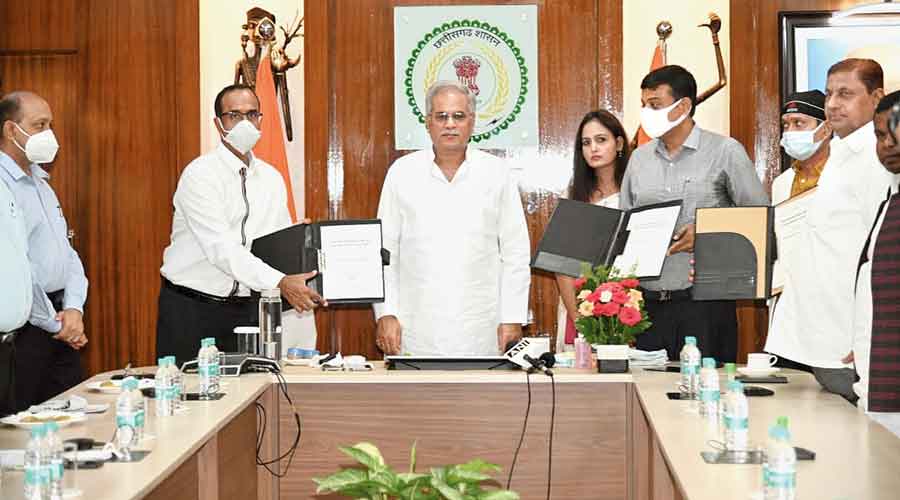Chhattisgarh chief minister Bhupesh Baghel has expressed confidence that his state can become the millet hub of the country in the coming times.
“Like minor forest produce, we want to make small grain crops also the strength of Chhattisgarh,” said Baghel at his residential office in Raipur where a memorandum of agreement was signed on Friday between the Indian Institute of Millet Research, Hyderabad, and the collectors of 14 districts under the Millet Mission.
Baghel said that under the Millet Mission, an initiative has been taken to give the farmers the right price for small cereal crops, provide input assistance, procurement arrangements, processing and ensure that they get the benefit of the guidance from experts.
The districts covered under the scheme are Kanker, Kondagaon, Bastar, Dantewada, Bijapur, Sukma, Narayanpur, Rajnandgaon, Kawardha, Gaurela-Pendra-Marwahi, Balrampur, Koriya, Surajpur and Jashpur.
Under the MoU, the IIMR will provide support and guidance for increasing the productivity of kodo, kutki and ragi, technical knowhow, availability of high-quality seeds and the establishment of seed banks in Chhattisgarh.
Apart from this, arrangements will be made for training farmers of Chhattisgarh through the Krishi Vigyan Kendra for disseminating scientific technology developed at the national level related to millet production by the IIMR at the field level.
In view of the increasing demand for millets like kodo, kutki and ragi in the country and abroad, the Millet Mission will not only increase the income of the farmers of Vananchal and tribal areas but will also give a new identity to Chhattisgarh.
At the same time, the processing and value addition of millets will also provide employment to farmers, women’s groups and youth. Kodo, kutki and ragi are produced in 20 districts of Chhattisgarh. In the first phase, MoUs were signed with the collectors of 14 such districts.
“Minor cereal crops like kodo, kutki and ragi are mostly sown in our forest areas. Crops like kodo, kutki and ragi are rich in nutrition. There is a good demand for these in the country. These are sold at very good prices in urban areas. But kodo, kutki and ragi grown in Chhattisgarh have not been able to come out of Vananchal. Till now, neither the support price of these crops was fixed, nor was there any arrangement for their purchase. Even after producing such an important and valuable crop, the farmers who grew it remained poor,” said Baghel.
He added: “The sate government has now started the Millet Mission to increase the yield of these crops, ensure good procurement arrangements and take them to the city markets after processing. Along with fixing the support price of kodo, kutki and ragi, the state government has also included these under the purview of Rajiv Gandhi Kisan Nyay Yojana. With this, now the farmers growing these small cereal crops will also be able to get input assistance like other farmers.”
The purchase of minor cereal crops would be done through the Van Dhan societies of the Chhattisgarh State Minor Forest Produce Cooperative Federation Limited. After processing these crops, they will be used in midday meals, public distribution system and nutrition programmes. Arrangements will be also made to take the finished products to the markets of the metropolitan cities. It has also been decided to manage Rs 170 crore 30 lakh for the next five years under the Millet Mission through the district mineral fund and other means.
“Under the Millet Mission, farmers would be given input assistance of Rs 9,000 per acre and Rs 10,000 per acre for growing kodo-kutki and ragi respectively instead of paddy,” said Baghel.
The chief minister said that like minor forest produce, large-scale employment opportunities would be created at the local level due to the value addition of small grain crops. “Like minor forest produce, we also want to make small grain crops the new strength of Chhattisgarh. In the next phase, MoUs will be signed with more such districts, where production of kodo, kutki and ragi is abundant,” said Baghel.
IIMR director Vilas A. Tonapi said there is a need to increase food diversity to address the problem of lifestyle diseases and malnutrition. “The year 2023 will be celebrated as the International Year of Millet. Through the Millet Mission, Chhattisgarh will be successful in making a mark as a millet hub in the country by 2023,” said Tonapi.
Federation managing director Sanjay Shukla said that IIMR specialists will be posted in the districts by the state government to guide the farmers to increase the production of millets while seed banks for small grain crops would be established in Bastar, Surguja, Kawardha and Rajnandgaon.
State forest minister Mohammad Akbar, industry minister Kawasi Lakhma, additional chief secretary to the chief minister, Subrata Sahoo, agriculture production commissioner M. Geeta, industry secretary Ashish Bhatt and industry director Anil Tuteja were also present.
Tonapi, IIMR chief scientist Dayakar Rao and the collectors of 14 districts joined the programme online.










